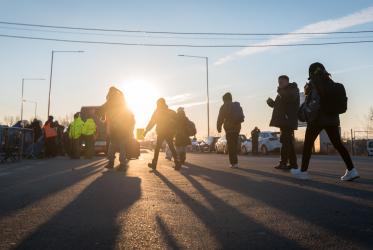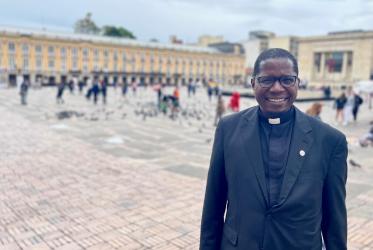World Consultation on Interchurch Aid, Refugee and World Service, Diakonia 2000
Larnaca, Cyprus, 19-26 November 1986
As Christians from all continents, and as women, men and young people, we have come together in Larnaca to affirm our commitment to justice and peace through diakonia. For all Christians, the choice between life and death is clear. Christ himself said: I have come to give you life and give it abundantly (John 10:10). Hence we opt for life and commit ourselves to working for its fulfilment through Christian service which is rendered to all the world. We are called to be neighbours to one and all.
Jesus Christ is Lord. We pledge again to obey him in the power of the Holy Spirit. We accept no other lordship. God's kingdom is one of Trinitarian sharing of love. God alone has ultimate ownership over matter and energy. God's spiritual and material resources belong to all people and all must have a say in their use.
In the twenty years since the consultation on interchurch aid in Swanwick, the suffering in the world has increased. We confess our sin and confess our complicity in upholding, tacitly or implicitly, structures and systems in the churches and society that oppress human beings, causing suffering for the people of God. We believe that diakonia - in all its many authentic forms - cannot be separated from the struggle for justice and peace.
And on every continent - at a time of increased terrorism and violence - the people are now struggling for life, for justice, for peace. In Latin America and the Caribbean, they struggle against economic, political and military structures that soek to choke their very existence, and the people are struggling to break the stranglehold of foreign debt and the inequality in distribution of land. In Asia, unjust economic structures, including the phenomenon of an export-oriented economy, have created devastating human consequences. Ethnic minorities and socially marginalized people struggle to combat centuries of discrimination and oppression. In South Africa and Namibia, people are suffering and dying, under the dehumanizing yoke of the apartheid regime which is continuously destabilizing the front-line and the neighbouring states, even the whole continent and the world. We strongly support the implementation of economic sanctions against the regime. We appeal to all people of goodwill to support and strengthen the economies of the countries affected, without whose solidarity the struggle would be difficult and even more people would die. In North America, Europe and Australasia the poor and oppressed fight for justice against ever more sophisticated forms of political and economic control. We express particularly our concern that in Albania all believers, Christians and Muslims alike, are denied the right to exist as religious and worshipping communities. In the Pacific, the people are struggling for self-determination and to protect their lives, their cultures and their environment from the poison of nuclear arms and wastes.
In the Middle East, the struggles for justice and peace take many forms. In Lebanon, the agony of a nation is the result of both regional and international forces which have disturbed and destabilized the nation. Death and repeated evacuations from homes and areas have forced people to suffer and to lose their power to regain their national sovereignty and unity. The Palestinian struggle for self-determination and right to a sovereign state demand more world support, and call for more active involvement of the world churches in bringing about peace and justice for all the peoples of the region. The Iran-Iraq war calls on us to develop new ways of expressing solidarity with all victims, and demands of us our appeal to the powers which are fuelling this war by the sale of arms, thus delaying a solution to the violence. It also demands us to encourage those who have takon initiatives for peace. The Armenian genocide, one of the first in our century, must not be forgotten and must be recognized by the world community. In Cyprus, the cry for unity among the divided communities and for peace, including the care for refugees and missing persons, needs to be supported.
On every continent, and under every social, political and ideological system, the forces of evil are being manifested. Growing militarization makes poor people poorer, and the nuclear arms race, reaching even outer space, threatens life on our beloved planet with complete destruction. The continued scourge of hunger shames us all. Growing numbers of refugees and growing xenophobia have created situations around the world where the protection of human life and dignity is jeopardized. The growth of migration puts at risk the rights of many who are subject to severe exploitation. As Christians, we must act, and act now, to ensure a decent life with dignity for all. Economic and social structures which perpetuate inequality and poverty must be replaced by a new international economic order and political structure which ensures the full participation of all people in the decisions which affect their lives. The existence of repressive regimes, which are supported by global economic structures, has led to violations of human rights on all continents, which we can only label as sinful. Violence in all its forms, especially state violence, must be confronted. As Christians, we reaffirm our fundamental belief that all of God's people must live in dignity and must determine their own future. The polarization and fragmentation which we see in many forms on all continents threaten the survival of us all. Throughout the world, the suffering and the pain and the struggle grow.
And yet, in the midst of oppression and pain, we also see hope and faith and joy manifested. Young people are in the forefront of the struggle and are challenging churches with their resistance and liberating diakonia. Women, who have always performed most of the diaconal ministry of the churches, are even more engaged in deepening Christian understandings of a diakonia centred on people. We recognize that many Christians are paying a price for their faith. The churches themselves must do much more to confront the unjust structures which have prevented women and young people from being full and active participants in determining the directions of Christian service. Young people and women must be the enablers and mediators in building networks of solidarity.
Everywhere the people make a prophetic diakonia essential for the churches' role in shaping the future. We have all experienced, in one way or another, the transforming power of Christian service. We have seen our faith deopen through service and our diakonia enriched by our spiritual quest for truth. And truth shall liberate us from all forms of selfishness, inviting us to serve for the glory of God as an act of giving of ourselves (see John 8:32). As Christians, we believe that God is manifest through all creation and God's servants become instruments of calling to repentance, obedience and love, proclaiming the force of the kingdom of God (see Matt. 11 :12). We recognize that justice will not be given by the powerful until and unless the powerless stand together. We know that God is with those struggling for justice and peace, and we know in our hearts - if not yet in our actions - that our place must be with them.
As the third millennium A.D. approaches, we dedicate ourselves, from this day forward, to work for justice and peace through our diakonia. We commit ourselves to implement a vision to identify ourselves and to be in solidarity with the people who are now in the process of struggling for peace based on justice. Our diakonia now and for the future must be based on mutual trust and genuine sharing. We recognize that people and churches on all continents have needs and that our diakonia must reach out to all those who suffer. We know the forces which confront us are many, we know that the road before us is long and painful. We know we can do no less than to pick up the cross and follow in the footsteps of the besuffering servant, Christ our Lord. His victory over death gives us life and hope.



